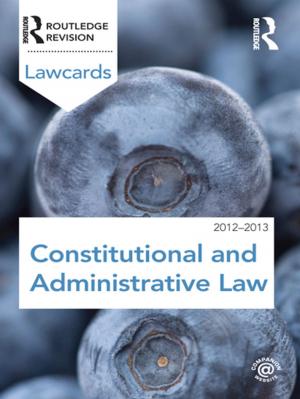The Social Fund 20 Years On
Historical and Policy Aspects of Loaning Social Security
Nonfiction, Social & Cultural Studies, Political Science, Politics, Social Services & Welfare| Author: | Chris Grover | ISBN: | 9781317015697 |
| Publisher: | Taylor and Francis | Publication: | February 24, 2016 |
| Imprint: | Routledge | Language: | English |
| Author: | Chris Grover |
| ISBN: | 9781317015697 |
| Publisher: | Taylor and Francis |
| Publication: | February 24, 2016 |
| Imprint: | Routledge |
| Language: | English |
In 2008 the Social Fund had been in operation for 20 years. This has provided a timely opportunity to not only critically reflect upon its introduction in 1988 and its operation in the past two decades, but also to place it within its historical context. There is a particular need to engage with the argument that was made in the 1980s that relieving need by way of loan was new in social security policy. In this groundbreaking study, Chris Grover provides the reader with evidence that this is not the case by locating Social Fund loans in a lengthy history of debate about, and practice in, loaning poor relief and social security. Using primary data hitherto unused in social policy research, Grover shows that there is a long history embedded in British systems of poor relief of authorities having the power to loan applicants either cash that had to be repaid or providing food and items, the value of which then had to be repaid. Understanding this history will give a greater depth to our understanding of the state's purposes in relieving the financial needs of the poorest people as well as to our knowledge of contemporary social security policy.
In 2008 the Social Fund had been in operation for 20 years. This has provided a timely opportunity to not only critically reflect upon its introduction in 1988 and its operation in the past two decades, but also to place it within its historical context. There is a particular need to engage with the argument that was made in the 1980s that relieving need by way of loan was new in social security policy. In this groundbreaking study, Chris Grover provides the reader with evidence that this is not the case by locating Social Fund loans in a lengthy history of debate about, and practice in, loaning poor relief and social security. Using primary data hitherto unused in social policy research, Grover shows that there is a long history embedded in British systems of poor relief of authorities having the power to loan applicants either cash that had to be repaid or providing food and items, the value of which then had to be repaid. Understanding this history will give a greater depth to our understanding of the state's purposes in relieving the financial needs of the poorest people as well as to our knowledge of contemporary social security policy.















